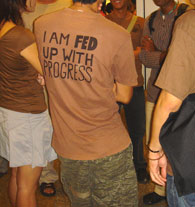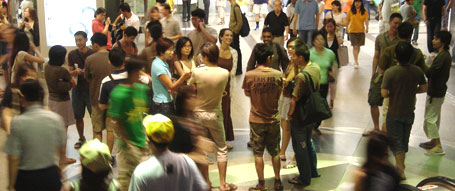Singapore's "Mr Brown affair" has escalated at each turn. A flash mob called for Sunday, 9 July 2006, to protest the government's over-reaction to a tongue-in-cheek newspaper column by Lee Kin Mun was met with intimidatory tactics by plainclothes police.

A group of protesters, including a number of familiar gay and lesbian faces, gathered at a busy subway station on Sunday afternoon to show their support for a Singaporean blogger and newspaper columnist whose satirical column entitled 'S'poreans are fed, up with progress!' drew a sharp rebuttal from a government spokesperson. The columnist was suspended by a newspaper shortly after the rebuttal. Above: a supporter in a 'I'm fed up with progress' t-shirt.
Ten percent of Singapore households had no income at all in 2005. Another 10 percent saw their average monthly income fall a whopping 19.7 percent over a 5-year period, from 2000 to 2005. These households, which had an average of S$1,470 (US$927) per month five years earlier, had only S$1,180 (US$744) per month last year.
The next 10-percentile group, also saw their monthly income fall, though by less. Where they had S$2,250 per month in 2000, they saw only S$2,190 per month in 2005, a 2.7 percent decline.
Another 20 percent saw little change in their household incomes, barely keeping pace with inflation. That left only 50 percent of Singapore households whose incomes rose over the last five years. But some of these did very well indeed. The top 10 percent of households in this city enjoyed a 14.8 percent increase in household income, from S$14,360 to S$16,480 over the same 5-year-period.
The government explained that this was the inevitable result of globalisation, but explanation doesn't help people make ends meet.
The cost of living had already become an issue during the recent general election in May, but barely six weeks after, hikes in electricity rates and public transport fares were mooted.
The column and the reaction
Lee Kin Mun, who writes under the pseudonym 'Mr Brown,' made this the subject of his regular newspaper column on 30 June 2006 in Today newspaper. (He also has a blog at mrbrown.com.)
With his usual biting humour, he wrote, "We are very thankful for the timing of all this good news, of course. Just after the elections, for instance."
For good measure, he added, "It would have been too taxing on the brain if those price increases were announced during the election period, thereby affecting our ability to choose wisely."
The next working day, the Ministry of Information, Communication and the Arts fired back. Its press secretary accused Mr Brown of "pouring sarcasm on many issues," dismissing his comments as mere "polemics dressed up as analysis."
She added, "It is not the role of journalists or newspapers in Singapore to champion issues, or campaign for or against the Government."
Seasoned observers saw the last bit as directed at the editors of Today newspaper, quite clearly telling them that they should not give space to any opinions that the government did not approve of. To do so would be "championing issues" or "campaigning."
The editors evidently got the message, and promptly told Mr Brown that his column would be "suspended."
Reaction throughout Singapore's blogosphere was loud and clear. From Rockson's unprintable street expletives to academic Cherian George's more refined criticism, hardly anyone had a good thing to say about the government's heavy-handed attempt at censorship.
Digging in their heels, Minister for Community Development and Sports Vivian Balakrishnan chimed in for the government, "The mainstream media have a crucial role in ensuring the quality and the standard of the discourse in a national debate." Effectively, he said a high degree of selectivity about subjects, viewpoints and style applies to print and broadcast. One might say, it's censorship dressed up as responsibility.
A flash mob was organised last Sunday to show support to Mr Brown. Quite a few lesbians and gays were spotted there. Participants had been asked to come wearing something brown, but the police were waiting, taking down details of people wearing brown T-shirts. How many others were intimidated from joining is hard to say.
It will be interesting to see if the matter develops further, and how long public anger lasts.
"Express diverse views", said PM Lee
Although there is nothing specifically gay about this whole affair, once again it demonstrates how suspicious the Singapore government is of any kind of dissent.
As this instance shows, newspapers, and most certainly radio and television too, comply with even the most indirect of warnings, denying voice to anyone the government does not want heard. Even widespread criticism of the government's disproportionate response appears not to have any effect.
Yet barely two years ago, when Prime Minister Lee Hsien Loong took office, he said in his inaugural speech: "We will continue to expand the space which Singaporeans have to live, to laugh, to grow and to be ourselves. Our people should feel free to express diverse views, pursue unconventional ideas, or simply be different. We should have the confidence to engage in robust debate, so as to understand our problems, conceive fresh solutions and open up new spaces."
After that, it's been one disappointment after another. There's an observable pattern of mouthing liberal-sounding words for PR gain, but keeping all controls in place. The media are still on a tight leash and the police ever ready to nip in the bud any gathering that does not cheer the government.
Sometimes the contradiction doesn't even require looking at actions that contrast with the words; the words themselves contradict each other. Speaking to the Foreign Correspondents' Association in October 2005, for example, PM Lee said, in answer to a question from the floor: "I don't think we are homophobic. I agree... that homosexuals are people like you and me."
While that might have sounded dandy, one should note what he said next. With hardly a breath in between, he added, "but there are some segments of Singaporeans who vehemently disagree with that, and we have to be aware of that... for each person to live his own life without impinging on other people."
He then went on to say that gay people must not be "intrusive and oppressive on the rest of the population" (i.e. impinge on other people) - but not a word about homophobes impinging on gay people - and on that basis, he ruled out same-sex marriage, parties and parades. "Well, you can do that in Sydney, in London, in San Francisco, but I'm not sure that I want to do that in Singapore."
In this climate, the gay issue is just one of the many issues, ranging from free speech to widening income disparity, that is struggling to be heard. On the one hand, this means that if LGBTs work at it, there are plenty of allies to be found among other Singaporeans who are equally dismayed by the authoritarian nature of our government. On the other hand, that there are so many angry citizens around tells us that the beast that we all face is a formidable one indeed.
Alex Au has been a gay activist for over 10 years and is the co-founder of People Like Us. Alex is the author of the well-known Yawning Bread web site. For more on the Singapore GE, visit Yawning Bread. He can be contacted at yawning@geocities.com.

